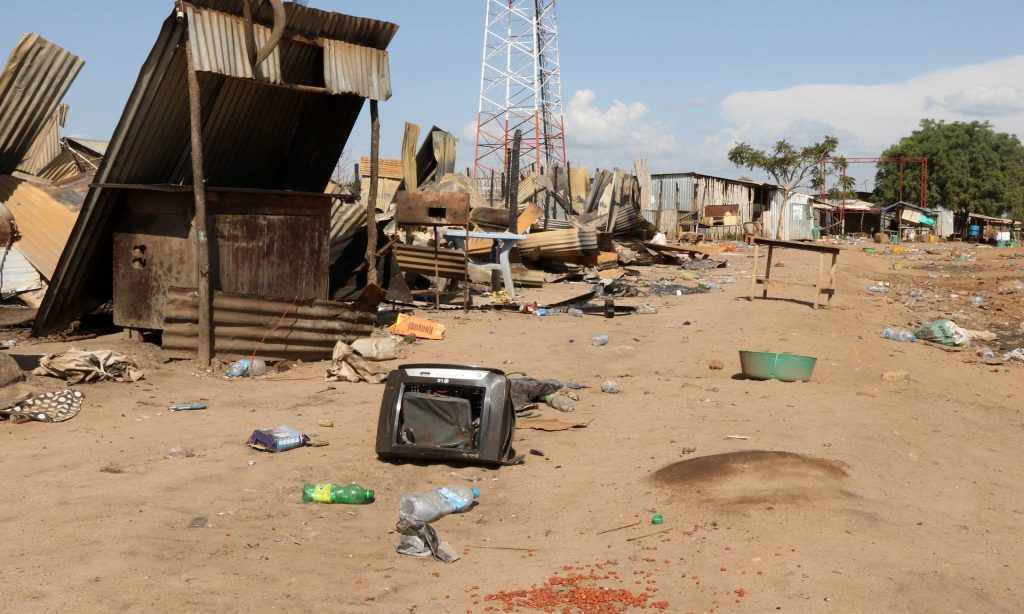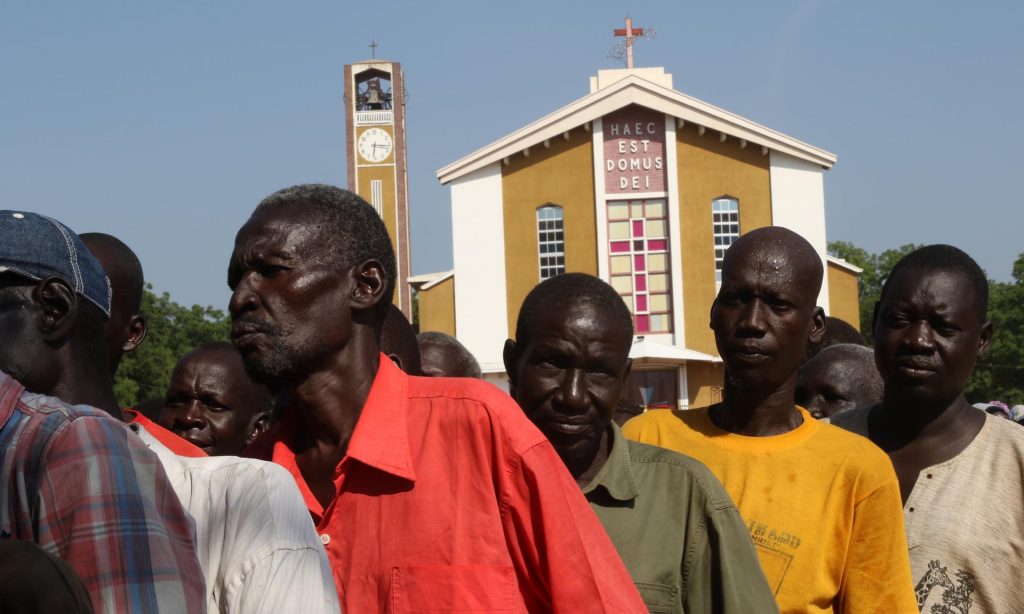
Photograph: Simona Foltýn
Burned tanks lined the side of the main road leading past the UN base in the Jebel area of Juba. Homes and market stalls had been ransacked. Military boots, caps and ripped pieces of uniforms were scattered on the ground. Dark spots in the dirt suggested where bodies had once lain, and although most had been removed, the smell of death lingered.
Much of the fighting during the most recent violence in South Sudan’s capital took place in Jebel. Clashes erupted between government and opposition forces on 8 July, killing hundreds and shattering hopes that a recently installed transitional government could bring peace after more than two years of conflict.
Although fighting has subsided since President Salva Kiir called for a unilateral ceasefire on 11 July, civilians continue to fear for their lives as they try to navigate the many checkpoints along the road, manned by unruly, trigger-happy soldiers from the national army, also called the SPLA.
One woman from the Nuer tribe was detained at a checkpoint and pulled away by a handful of government soldiers. Fearing rape and death, she tried to run, but froze when one of the soldiers yelled and cocked his AK-47, ready to pull the trigger.
“They said they would kill me,” the woman, whose name is being withheld, later said. “I was coming back from the market to the UN base when the soldiers stopped me. They asked for my phone and my money. I gave it to them, but they still didn’t let me go,” she said.
Aid workers who happened to pass the checkpoint intervened and brought the woman to safety. But many others weren’t so lucky. The body of a teenage boy, possibly shot on Saturday night, still lay in the middle of the road on Sunday morning.
The return of violence to Juba, which had been stable since the early days of the conflict that began in December 2013, is a major setback for a troubled peace process, marred with ceasefire violations and delays even before the most recent clashes.
The power-sharing unity government formed by Kiir and opposition leader Riek Machar in April is teetering on the brink of collapse, with Machar and other opposition members still in hiding. Opposition forces numbering nearly 1,400 were brought to Juba in April – amid a huge push by the international community – to form part of joint military and police units, but many of them have been killed, with the rest pushed out of the capital.
On Thursday, Kiir assured regional leaders he was committed to the peace deal, calling on opposition members to resume their roles in the transitional government and promising them protection. But only hours after Kiir made the statement, the opposition’s minister of energy and dams, Dhieu Mathok, said the government’s security forces detained and beat him in his hotel.
Regional leaders rushed to the capital in an effort to salvage the peace deal, while the UN and the African Union tabled proposals to beef up the UN peacekeeping mission and impose an arms embargo, options that are unlikely to garner sufficient support among international and South Sudanese leaders. On Thursday, Kiir said he “will not accept a single [peacekeeping] soldier”.
“The government sounds very uncompromising right now,” said Clémence Pinaud, an assistant professor at Indiana University’s Department of International Studies, who focuses on South Sudan. “The government needs this peace much less than the opposition because they have the military superiority.”
The slow and divided response of the international community has fuelled uncertainty over the peace deal, further allowing lawlessness and violence to continue in the embattled parts of town. Embassies and many aid agencies have been evacuating staff over the past few days.
Few of the thousands of civilians who fled the area have returned to inspect their homes amid a heavy SPLA presence and widespread looting. Groups of young men, some in uniform, embarked on a pillaging spree, meticulously combing through abandoned houses. They piled pieces of furniture, jerry cans, cases of beers and tyres on to anything that could move. Some rode motorcycles, some pick-up trucks, while others carried their loot on foot, all under the watchful eye of government soldiers.

Photograph: Simona Foltýn
The SPLA’s spokesman denied widespread looting and harassment by government soldiers. “The SPLA is a huge army, you cannot rule out having some bad elements within the force,” said Lt Gen Lul Ruai Koang. “If there are SPLA soldiers involved, they are brought to the books.”
Many of those who fled their homes have sought shelter around St Theresa’s cathedral, sleeping in schools or in relatives’ homes at night and congregating at the church during the day to get aid.
“I ran away with four of my brother’s children. We don’t know where the parents are,” said Helen Kaku, who had buried another brother last week. Asked whether she felt safe enough to return home, she said she would, if she wasn’t too weak from hunger. “I will take the children back home. If they want to kill us, they will kill us.”

